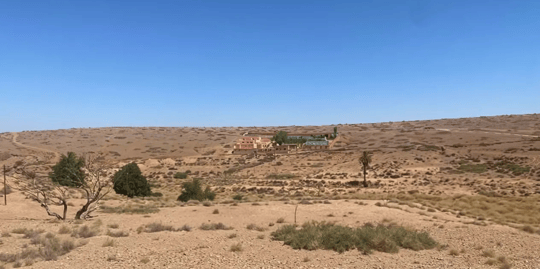On Wednesday, September 3rd, I had the privilege of stepping into the heart of the High Atlas Foundation’s work, visiting their nursery in Akrich and later the Achbarou Women’s Cooperative. From the very beginning, the journey itself felt like a story unfolding. The road carried us through sweeping valleys and rocky hills, the vast High Atlas Mountains towering in the distance. The contrast was striking, desert sands and sunbaked stone scattered with stubborn bursts of greenery, life thriving where it had no business doing so.
When we arrived at the nursery, the heat hit us immediately. It was 37°C that day, what the caretaker casually described as cooler summer weather. He spoke with the calm authority of someone whose family had tended this land for three generations, their work forever tied to the nearby Jewish cemetery where a saint is buried. As he explained, earlier that summer temperatures had soared past 50°C for weeks at a time, with nights barely dipping below 30°.
Unsurprisingly, this devastated many of the saplings, only about two-thirds survived compared to HAF’s usual 95% success rate. Still, the nursery stood as a testament to human ingenuity, with greenhouses sheltering over 10,000 saplings and a solar-powered irrigation system (an investment of $70,000!) ensuring their survival.
From there, we set off on a short trek to Achbarou, a nearby village that holds one of the most inspiring cooperatives I’ve ever seen. Inside, women worked with skill and patience to produce the most breathtaking rugs, each one taking three to four weeks to complete depending on the design’s complexity. What struck me most was how sustainable their process was. Every step, from shearing sheep (owned by community households), to cleaning and spooling the wool, to dyeing it with natural herbs, was deeply rooted in local tradition and ecology. Watching their hands move with such purpose, I felt humbled by the patience and artistry that goes into a single rug.
But the hospitality of these women extended far beyond their craft. Upstairs, they had prepared a feast for us consisting of steaming tajines, bread baked fresh that morning, and warm laughter at the table. As we ate, the atmosphere felt incredibly comforting. Then, the women began to sing. Their voices filled the room with a joy that was almost childlike, yet deeply powerful. It wasn’t just music, it was resilience. These were women who had lived through the devastating 2023 earthquake and another tremor just the night before our visit. And yet, in that moment, their spirits still soared.
I left Achbarou that afternoon with more than just memories of stunning landscapes, innovative nurseries, and beautiful rugs. I carried with me the reminder that resilience often comes wrapped in song, hospitality, and community. The women of Achbarou and the caretakers of Akrich embody a strength that is quiet, steady, and profoundly moving, a strength that stays with you long after the journey ends.
